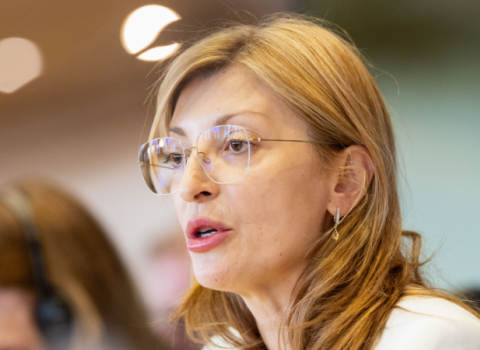On 30 September, the European Commission presented a package of three major initiatives aimed at unlocking Europe’s potential in education, research and innovation. The Commission published two dedicated Communications on the European Education Area and the European Research Area. It also presented the updated Digital Education Action Plan, whose purpose is to support the use of technology in education and the development of digital competences.
EUA welcomes the Communications and the Action Plan and recognises the Commission’s efforts as a major leap forward with the potential to greatly strengthen Europe through knowledge.
“We have two Communications here that talk well to each other and the Action Plan is very timely to address challenges and underpin forward-looking practices in digitally enhanced education,” said EUA Secretary General Amanda Crowfoot. “However, we must ensure that the governance of the European Research Area and the European Education Area enable dialogue and synergies, is transparent and directly involves stakeholders.”
Crowfoot also stressed that the EU actions must focus on the areas where we get the most out of working at the European level and build on Europe’s rich and diverse research and higher education systems in a bottom-up manner.
Specifically regarding the European Education Area, EUA sees the Commission Communication as an acknowledgement of the vital contribution of education to Europe’s future and the sustainability and long-term resilience of society. The Communication outlines an ambitious set of EU actions in view of making the European Education Area a reality by 2025. It would have six dimensions that are all of importance to universities: quality in education and training, inclusion and gender equality, green and digital transitions, teachers and trainers, higher education, and geopolitical dimension.
Regarding the European Research Area, while EUA is pleased with the new energy surrounding the topic, the Association calls for the co-creation of a definition of the central concept of research excellence. Excellence is not limited to highly cited publications but needs to be based on the many and diverse contributions of the research community, notably including Open Science practices, citizen engagement, and impact on society.
EUA also calls on policy makers to boost funding, especially considering the vast aims of the new European Research Area.
“EUA is disappointed and concerned to see that the level of ambition for the new ERA is not matched by sufficient investment under the current proposal for Horizon Europe,” said Crowfoot. “This is despite R&I being key contributors to the green and digital transitions, as well as society’s recovery from the Covid-19 pandemic.”
The updated Digital Education Action Plan comes at a critical time. EUA welcomes the Action Plan’s emphasis on Europe-wide enhancement of connectivity and infrastructure, and cooperation. The European Union has put strong emphasis on digitalisation, and this is reflected in the EU’s next seven-year budget. The ongoing Covid-19 crisis requires immediate measures to better equip institutions, teachers and learners. However, European Union policy and actions will also help to ensure that digitally enhanced education does not get branded as an emergency mode, but instead foster forward-looking strategies and actions beyond the crisis – which are paramount for resilience and innovation.
EUA played a role in providing key input to the Commission on all three initiatives. Very recently, EU Commissioner Mariya Gabriel recognised EUA for these efforts at the EUA Funding Forum, citing the important role of universities in their co-creation and co-design.
“We want to empower universities in Europe to develop common strategies creating the critical mass to deliver on Europe’s major challenges, including through facilitating cross-border cooperation and sharing of digital infrastructures and resources,” Gabriel said at the Funding Forum.
All of Europe’s universities have a great role to play in these initiatives. EUA will continue to engage with the Commission on all three topics and will keep members up to date on their progress. EUA will also publish more detailed responses to the two Communications in the coming weeks.
This article was first published on 30 September by EUA.





 A unique international forum for public research organisations and companies to connect their external engagement with strategic interests around their R&D system.
A unique international forum for public research organisations and companies to connect their external engagement with strategic interests around their R&D system.